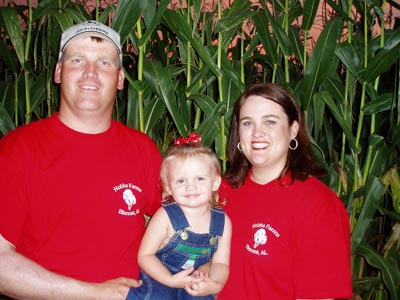Outstanding Young Farm Family: Wheat & Feed Grains Division

Some days are not as good as others, but Jessie Hobbs says he’s never had a bad day on the farm. No, not one.Not when the rains don’t come.Not when the sun doesn’t shine.Not even when yet another piece of equipment goes on the blink.”I’ve never had a bad day in this line of work — I love it that much,” he says. “Now, some days are not as good as others, but I’m as tickled as a dead pig in the sunshine. There’s nothing I’d rather do than this.”Nope, nothing. Heaven to Jessie is about 3,000 acres of row crops scattered in every direction from his home just outside Elkmont in Limestone County all the way into Giles County, Tenn. He plants wheat, corn, soybeans and cotton in large amounts. There’s 1,750 acres of cotton, 300 acres of soybeans, 270 acres of corn and 250 acres of wheat.That’s in addition to 100 acres of hay he grows for commercial sale, and a patch of pumpkins that he sells to the public.It’s a demanding job, he says, one that requires working “from can to can’t.” But it has its rewards — not the least of which was being selected, along with his wife Amanda and 2 1/2-year-old daughter, Sarah Bess, by the Alabama Farmers Federation as Outstanding Young Farm Family in the Wheat & Feed Grains Division.”You’ve got to be able to enjoy yourself out here,” said Jessie, taking a break on the tailgate of a recently purchased (but used) hybrid pickup truck. “When that $1,000 auger breaks or that $1,000 motor just crumbles, you’ve got to be able to joke about it. You’ve got to go on and get it fixed but you can’t let it bring you down.”The fourth Hobbs generation to earn a living from the soil, Jessie was driving a tractor by age 5. “It’s all I ever wanted to do,” he said. But he promised his schoolteacher mother that he’d get his degree, and brought a bachelor’s degree in soils and agronomy from Auburn University back to the family farm in 1998.Now 31, Jessie has put his education to work on the family farm where he’s responsible for all purchases of seed, chemicals and fertilizer. He sings the praises of injectable fertilizer and plans some variable-rate lime application this year on a plot that’ll test the relationship between soil pH and yield.”Daddy says I’ve always got a test going somewhere,” said Jessie, who owns a third of the family farm with his father, Howard Hobbs Jr., and his mother. “But you know, without testing and research, we’re sitting idle. And if you’re sitting idle, you’re not going anywhere.”That’s why he’s on the steering committee to land an ethanol plant in north Alabama. “You know, not many things will raise people’s eyebrows but you start talking about $1.80 gas and — wham! — they’ll sit you down and, ‘Say that again. I was eatin’ my bologna sandwich and didn’t hear you.'”Skyrocketing diesel fuel prices, soaring tech fees, and a late-April frost so chilling that it killed the Johnson grass in his cornfield are all reasons enough to make most guys want to hang it up. Not Jessie. “It would be a heckuva lot easier to run, but we’ve still got to eat,” he says. Besides, he says it’s his goal to leave the world in better shape than what it was when he found it.Part of that goal is feeding the world’s hungry. Another part is replenishing the soil through sensible crop rotation and no-till farming.And still another part — a really big part — is seeing that Sarah Bess, a bright-eyed blonde who’s the apple of her father’s eye, is raised in the country.”I can’t think of a better place to raise a family,” Jessie says. “I’ve always heard that farm-raised produce is better than the store’s. And I think it’s true also with children.”Amanda Hobbs agrees. “As soon as I pick her up after work in the afternoon, she wants to go see Daddy,” said Amanda, who teaches business education in grades 9 through 12 at Ardmore High School. “She always wants to go to the field or shop and find her Daddy. She’s adjusted well to his long hours because we try to keep him company, like going and riding with him on the combine because it must get lonely out there all day.”Farm-raised children appreciate the work ethic,” Amanda added. “They’ve seen how hard farmers and their farmhands work, and I think that’s important for a child to grow up seeing. You can’t call in sick when you’re a farmer. Children of farmers grow up knowing the value of hard work and how it plays out in their own lives.”It’s a lesson Amanda said she has had to learn herself since marrying Jessie seven years ago. “One particular thing I’ve learned about Jessie is the quality of hard work,” she said. “I knew farmers worked long hours, but I never knew how hard they work. That’s something that I’ve really learned to appreciate, and I am so thankful that Jessie really loves what he does. He’s passionate about his work.”Why shouldn’t he be? There’s never a bad day at the office.
